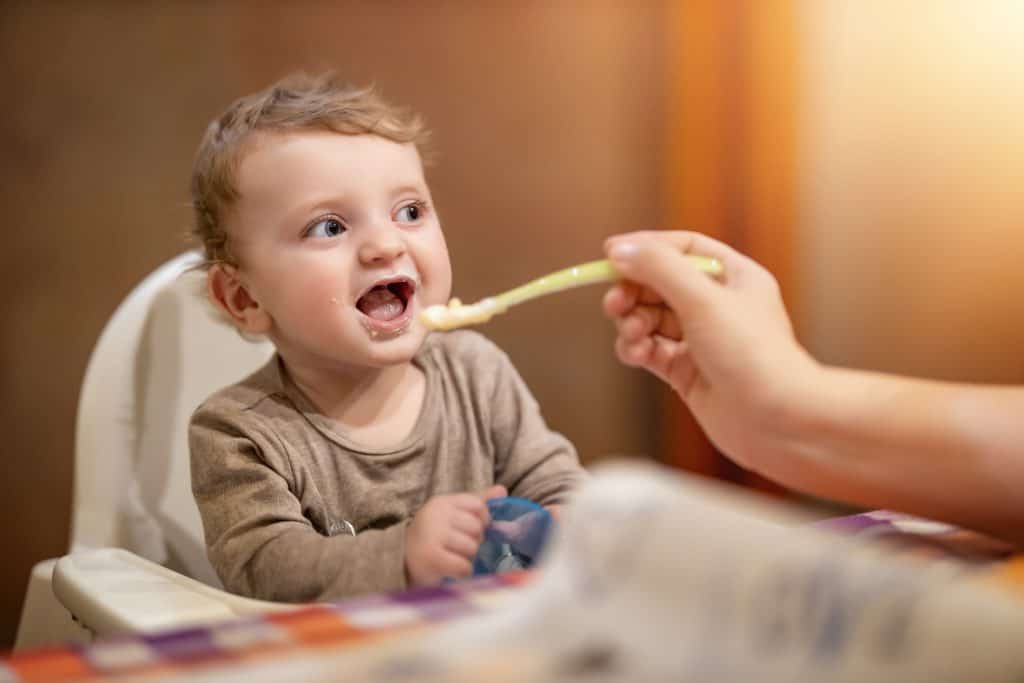
What to Feed the Baby in the First Year
5 min readWritten by Editorial Team

The first year is always critical for the new baby. What will she eat, what will she wear, how to keep her safe, vaccinations… these are common questions all first-time parents ask. Food is, of course, very important because it is directly related to the development and the child’s growth. Babies breastfeeding will take between 8 and 12 feedings in a day. Those on formula foods will need between 6 and 10 feeds a day. Usually, solid foods will be introduced when the baby is around 6 months. Always remember, nutrition is key in the 1st year. Make sure to start a healthy eating habit quickly for your infant. But the feeding must always depend on the readiness of a child because every baby is different.
How Often an Infant Must Feed
They are still very small, but they can know when feeling full or hungry. Feed her whenever she feels hungry. Each breastfeeding session is usually between 10-15 minutes. Formula and breastfeeding can be done deep into the night as well if the infant wakes up and cries because she is feeling hungry. Some parents add rice cereals to the bottle to make the baby sleep through the night. This is not recommended because it can easily cause too much weight gain. It may also cause choking hazards.
Infants will drink less as they start taking solid foods. It is perfectly normal, so don’t worry. Solid foods should be increased slowly while bringing down the formula or the quantity of breastmilk. Don’t make a 100 percent switch overnight.
Many moms are increasingly opting for formula feeding now as it offers several advantages. For example, she can take medicines if required, she can know exactly how much she is consuming, and both parents and others in the family can also share the responsibility. She has carried her baby for 40 weeks. With formula feeding, she can finally take a break and get back to her normal pre-pregnancy days. There is no problem with formula feeding. There are many high-quality formula products now like the HIPP Dutch formula that provides all key nutrition to the infant.
How to Know Whether the Infant Is Full or Feeling Hungry
Infants will cry for various reasons like when feeling tired when they are upset or hungry, or when you must change the diaper, or are feeling uncomfortable. There will be many signs of hunger, like –
- Trying to reach for a bottle or the breast
- They may point at the feeder’s hand or the food, even the spoon
- Smacking lips
- You may see her sucking her fingers
Infants will get upset if the parents miss the hunger cues. She will cry or become fussy. So the parents must be careful. Try to identify her hunger cues.
Signs that will tell you that the infant is full –
- She may fall asleep
- She may pull away from the spoon, breast, or bottle
- The baby may shake her head, keep her mouth closed or change her position
- She can even hand back food to the parent or feeder
When to Start Solids
Some doctors and pediatricians say that solid foods must be introduced when the infant is around 6 months. But, if the infant is taking both formula and breastmilk, then you may start solids even before this – anytime between 4 and 6 months.
Signs that will tell you whether your child is ready or not –
- She can hold her head properly for a long time
- She is able to sit upright easily
- The infant looks at you when you eat and is showing interest
- The child is asking for more food even after the 8-12 feeds for breastfeeding and 6-10 for a formula in a day
- She is opening her mouth readily during spoon-feeding
Guidelines to Follow During Feeding
Remember these guidelines during infant feeding.
- Always feed small amounts when starting the solids. A teaspoon will be enough in the beginning. Increase to one tablespoon.
- Dry rice-based cereals are good for starting. You can then introduce fruits, veggies, and meats.
- Never introduce more than one new thing at a time. Look out for allergies first before introducing the second ingredient only after 3-5 days. Stop it if you see a reaction.
- Use sweet potatoes, pureed corn, or peas if you are making the baby’s food yourself. Always buy fresh produce. Do not refrigerate for long. Avoid flavorings, sugar, and also salt. Also avoid squash, beans, beets, carrots, and spinach for the time being.
- Vegetables and also meat have more nutrients in each serving compared to cereals and fruits.
- Don’t serve fruit juices to babies who are below the age of 1 year. You can however give 100% pasteurized juices, but without any added sugar. But make sure to only give it when your child is closer to a year and also limit how much you serve.
- Healthy infants don’t usually need a lot of water. But more water if it is too hot. Serve extra water when she starts taking solid foods.
- Foods for infants must have a lot of vitamins, minerals, protein-like poultry products, meat, vegetables, fish, and colorful fruits.
- Avoid serving sugar or salt-rich and also spicy foods. Babies should not eat whole grapes, seeds, nuts, raw fruits, chips, popcorn, vegetables, raisins, and marshmallows because of choking hazards.
Here Are Some More Tips to Remember
- Avoid the microwave – Never microwave warm the food and also the baby bottle. There is a risk of burning her mouth or throat. Fill a pan with warm water and place the food or bottle in it. You can also warm under running tap water. Always shake her bottle after each warming because this will heat the food and milk evenly.
- The correct feeding position – If the infant is sitting upright, then always feed with a spoon. Never feed when your child is lying down. Raise her a little bit and then feed. Also, make sure that she is awake while feeding. Milk can get collected in her mouth if she is asleep. This can cause choking and ear infections.
- Avoid cow milk and honey – Serve cow milk only after the first year. Honey can cause baby botulism (a toxin is responsible for this). Serve honey later.
- Solid foods – They should never be served in bottles because babies can easily overeat and they also present a choking hazard. Her feeding skills may also slow down. Also, encourage the infant to give up her bottle on the first birthday.
- Proper monitoring – Make sure that you keep a close watch when your child is eating. Never leave the room while she is eating. If you have to leave for some reason, then ensure there is someone else you can depend on. A child is a pride and joy for parents. But parenting isn’t easy early on, especially for first-time parents. Always be careful, particularly with feeding.

Editorial Team,
With a rich experience in pregnancy and parenting, our team of experts create insightful, well-curated, and easy-to-read content for our to-be-parents and parents at all stages of parenting.Read more.
Responses (0)
Want curated content sharply tailored for your exact stage of parenting?
Related articles

Peter Pan Story With Moral For Kids in English

Second Trimester Pregnancy Advice For Partners – Week by Week

Will Staying Fit Save You Money On Health Expenses?

Top 100 Best Birthday Wishes For Twin Brothers and Sisters – Double The Celebration, Double The Fun!

Understanding the Parental Role in Creating Safe Learning Environments for Children

6 Tips Young Parents in College Need to Follow
Sponsored content
Discover great local businesses around you for your kids.
Get regular updates, great recommendations and other right stuff at the right time.






